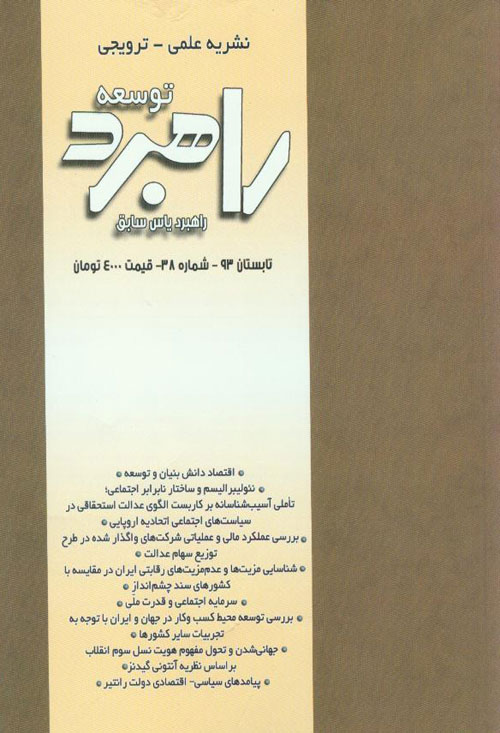فهرست مطالب

نشریه راهبرد توسعه
سال دهم شماره 2 (پیاپی 38، تابستان 1393)
- 248 صفحه، بهای روی جلد: 40,000ريال
- تاریخ انتشار: 1393/06/25
- تعداد عناوین: 9
-
-
صفحه 5
- مقالات
-
صفحه 116
-
صفحه 215
-
Page 41This paper seeks to examine the relationship between Neo-liberalism and the social unequal structure. Is Neo-liberalism has been effective in the rise of the social unequal structure in EU, comparing to its past? In this study, we consider the EU's members and their policies from shifting the welfare state toward Neo-liberalism in the past two decades, as a case study. According to the proposed hypothesis, Neo-liberalism by replacing policy of entitlement justice versus distributive justice, that was the representative of the welfare state, has affected the emergence of social and economic unequal structure in advanced Western societies like EU's countries, and caused the Problems in the areas of health, unemployment and retirement. In this paper, firstly we illustrate the Europe Union and its crises. Then, we consider the replacing the neoliberal policies rather than welfare state, and entitlement justice rather than distributive justice. In the following, we define each of these two politics and explain their functions. In the final section, we explore consequences of implementing entitlement model in the Union.Keywords: Neo, liberal Politics, The Welfare State Structure, Distributive Justice, Entitlement Justice, European Union
-
Page 61
According to the importance of justice stake scheme as the high volume firms was divested by this method, and as regard to one of the important aim of this scheme is to improve of the efficiency and to increase the yield of them. This paper examines the change in operating and financial performance of said companies that were divested in the justice stake scheme. Profitability and operating efficiency rates were used to measure the performance that collected before and after the implementation of justice stake by 5 repeated measurements during 10 years and the repeated measure variance analysis were used to examine the data. The results indicate that significant decrease in return on equity and significant increase in net income efficiency. Possible reasons for these results are the accumulation of the profit and capital increase in 1389- 1390. No doubt the real consequences of the implementation of the justice stake scheme will appear in the years following the delivery of stake to the peoples.
Keywords: Justice Stake Scheme, Financial, Operating Performance, Repeated Measures with Variance Analysis -
Page 80The main purpose of this article is recognizing the advantages and disadvantages of Iran’s competitiveness compared to Central Asia countries and Middle East countries in order to provide the improving competitiveness. In this regard by using discretional– analytical method we have defined the Iran's position among the above mentioned countries. The results show that the main disadvantage of competitiveness of Iran, due to the current dominant situation of the country's economy such as tighten economic sanctions and unfavorable consequences of that such as import restrictions, access to the financial and new technology services, increase of transactional costs, final cost of domestic products and reduced quality of goods and similar issues like those, is in technological readiness, development of financial markets, development of good's market, and stable macro environment of economy (high inflation and low rate of country's credit) and the most important strength of competiveness is related to the security issues (Organized crime, violence and misconduct charges); quality of rail infrastructure, quality of power supply, Factors associated with quantity of education and finally market size (foreign and domestic market). according to lack of the above mentioned advantages, the main way to improve competitiveness is to provide necessary infrastructures based on the information technology, paying attention to the Components of the Knowledge Based Economy, Accelerate the development and review of laws and regulations facilitating business conditions, planning to enhance national production, and reduction of dependence on foreign countries and round up of sanctions.Keywords: Advantages, Disadvantages of Competitiveness, Iran, Middle East, Central Asia Countries
-
Page 116in the past, to assess the national power was emphasized on the sensing material and intangible resources, but now in addition to these resources, another concept called social capital is in the spotlight. Social capital with its main components, namely trust and interaction, facilitates cooperation and solidarity in order to gain mutual benefit and common interests. Thus, the more social capital, the more solidarity and national power. In result, the state appear with greater power and authority in order to pursue its own interests and foreign policy objectives in international arena.Keywords: Interaction, Trust, Social Capital, Soft Power, National Power
-
Page 148Today, improving the business environment in order to provide the necessary conditions for entrepreneurs and the private sector to achieve economic efficiency as a strategy has been discussed in different countries. The report of the assessment and evaluation of business regulations and their enforcement among 183 countries and selected cities at the global and regional deals. The report, to be released in 2002, the small and medium enterprises in terms of duration of activity is focused firms. The aim of the present study Experiences transfer, design and evaluation of the business environment, policy makers and decision makers in other countries to Iran. Experiences in order to assess the business environment in several countries and a review is presented. This experience and studies related to the evaluation and modification of critical points in the business environment that they can be utilized according to its terms. In this article the experiences of four countries: South Korea, Macedonia, Mexico, and the United Kingdom are mentioned.Keywords: Development of the Business Environment, Privatization, Economic Liberalization, Resolve Commercial Disputes
-
Page 195The youth are looking for their identity and continually ask themselves and their community because they have been an appropriate impression whereas the adults have the consolidated social identity. The first and second generations (the older generation) have features such as simple living, self-esteem, and…. While the features of the third generation are different from the previous generations that can be mentioned to the characteristics such as demanding reform in the field of culture, demanding of short-term accommodations, having a critical attitude, expected person. These features make that political and cultural identity of this generation is distinct (third generation) of previous generations; in the era of globalization, create the world without boundaries and encounter the components and elements of different cultures together as inevitable and are placed next to each. By investigating the cultural impact of globalization According to theory of Anthony Giddens can be stated that Psychological characteristics of first and second generation on one side and the third generation of the revolution on the other hand, Indicates that cultural consequences of globalization is mostly compatible with the psychological and sociological characteristics of third generation and leads to important psychological and sociological issues. This paper attempts to examine the impact of globalization on the identity of the third generation according to the theory of Anthony Giddens.Keywords: Globalization, Identity, Third Generation, Anthony Giddens, Time, Location
-
Page 215A significant number of experts in oil problems and the politics, particularly the authorities in Middle East problems regarded a special guideline in political studies in developing countries during 1910 s which is known as rentier state theory. This theory is generally placed into political economics procedure and it pays attention to the bilateral relationship between the state and the economy, particularly the role and effect of state and it addresses the effect of renti resources on its social behaviors. According to this theory, each state wich a significant amount of its earning / income (42 percent or more) comes from foreign rents and receives them Generally without any relationship with domestic product processes, it is regarded as rentier state. Such a state generally represents social dynamics which is different from social dynamics of countries which provide their earnings through enactment of tax on domestic economic activities. Rentier state has a significant effect on the sovereignty, society and economy as well as on the relationship between the government and the society. In belief of many experts, this effect is anti – development to a high extent. Generally, the goal of this writing is study the effects and outcomes rentier state theoretically and using of descriptive – analytical method.Keywords: Rent, Rentier State, Political Economic, Authoritarianism, Non, Development


